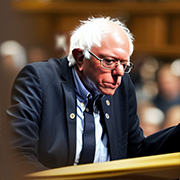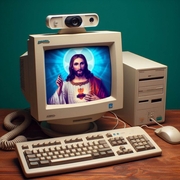- Pepe Silvia Browne
- Jan 1, 2007
-

|
future historians gathered around barrels full of burning funkopops will tell everyone about money and how we claimed to have infinite amounts of it
"How would that work? You are just making things up old man"
"No. There was an infinite amount of money."
"That's literally impossible. I can't claim to have infinite amounts of anything"
"But if everyone collectively agreed that you could decide how many things you had you could just claim you had an infinite amount of them"
"grandpa what was it like during the age of surplus? When you never had to think about where you'd get your next meal and got to roam around the world in powered carriages?"
"It fucken sucked we were all bored out of our minds lol"
|
 #
?
Mar 16, 2023 12:17
#
?
Mar 16, 2023 12:17
|
|
- Adbot
-
ADBOT LOVES YOU
|

|
|
#
?
Jun 7, 2024 06:54
|
|
- Red Baron
- Mar 9, 2007
-
no lube anal fan
|
I love it, amazing, BOTH numbers now go up: money printed and interest rates, True Number’s most precious children are finally ascending to the sky just like their progenitor!
ty Jay
|
 #
?
Mar 16, 2023 12:38
#
?
Mar 16, 2023 12:38
|
|
- Mr Hootington
- Jul 24, 2008
-

I'M HAVING A HOOT EATING CORNETTE THE LONG WAY
|
*dusts off memes*
Hello old friends
https://www.youtube.com/watch?v=Nt6ILTNaqQ8
https://www.youtube.com/watch?v=WEMCYBPUR00
https://www.youtube.com/watch?v=jk1eU_zlf3s
|
 #
?
Mar 16, 2023 12:50
#
?
Mar 16, 2023 12:50
|
|
- Mr Hootington
- Jul 24, 2008
-

I'M HAVING A HOOT EATING CORNETTE THE LONG WAY
|
What if we insured all deposits by increasing fees and taxes on people? Actually moral hazard is when entities play with the rules of the system.
https://twitter.com/SquawkCNBC/status/1636332947946057728?t=TARjh6sDgCNh6_waPsgYGQ&s=19
|
 #
?
Mar 16, 2023 12:54
#
?
Mar 16, 2023 12:54
|
|
- super sweet best pal
- Nov 18, 2009
-

|
I thought I understood what money was, now I'm not so sure.
|
 #
?
Mar 16, 2023 12:58
#
?
Mar 16, 2023 12:58
|
|
- Mr Hootington
- Jul 24, 2008
-

I'M HAVING A HOOT EATING CORNETTE THE LONG WAY
|
Permabulls stay winning
|
 #
?
Mar 16, 2023 12:59
#
?
Mar 16, 2023 12:59
|
|
- Hockenheim
- Oct 20, 2022
-

by VG
|
the way to understand what’s happening right now is not at all what orthodox economics wants to tell you. this is sort of an effort post.
I’m completely simple terms - this is the consequence of Obama and Geithners policy in 2008. when the banks blew up back then, we had a choice - do we as a society protect the creditor or protect the debtor? the answer came clearly down to protecting the creditor - the banks.
the main reason for that is that is because we were in the midst of a revolution - the free trade agreements and de-industrialization policies of Clinton staring with NAFTA and the admittance of China to the WTO in 2001 were turbocharging the equity and bond market.
with labor being squeezed and eventually collapsing by moving overseas, the main enemy of neoliberalism was conquered. unions fell apart and factories shut down, but because of the rise in technology coinciding with dirt cheap foreign labor costs, productivity went through the roof. around the same time, business schools were churning out MBAs that based their framework around finance instead of industrial engineering - older schools like GMI in Flint (now Kettering University) which trained executives to think in terms of industry were giving way to Stanford and Harvard MBAs who prioritized the CFO led model of prioritizing the stockholder.
these coinciding factors led to executives gutting their companies to shutter factories, move them overseas, and largely focus on financial engineering to boost their share price. a characteristic of finance that separates it from a real economy is that financial returns compound while a real economy looks like an S curve - a financial economy simply grows unbounded.
that’s because finance is debt based. banks create debt and make claims on assets. their source comes from thin air - when you apply for a mortgage, they simply push a button and come up with a the money. in theory, they are required to keep a reserve to cover deposits - with deregulation, it has given them less and less to cover on hand, to now virtually guaranteed risk-free government backed bailouts.
i also think it’s important to understand what exactly a bank does. let’s say you deposit some money into one. from a banks balance sheet perspective, your deposit is a liability in an accounting sense. this means that they package the liability, your deposit, into an asset via an exchange on the market.
because a banks primary product is making claims on real assets, they naturally are rent seeking institutions. in order for them to grow and make money, they need 2 things - an ever larger pool of assets to lay claims on and a source of easy credit to lever their claims on to increase their rate of return. the first part is done via privatization - by moving assets from the public domain, such as land or healthcare or education, to the private one, they force the entire population to take on loans, which gives the banks their pool of assets to lay claims on.
the second piece comes from the availability of a Bank themselves to get short term loans. a bank is a special institution under financial capitalism that can enter a repo market with its central bank, the fed. they can collateralize and obtain credit from the central bank and can use that same credit to cover their liabilities (aka deposits) or go into the financial markets and buy stocks, bonds and products.
banks pre 2008 were making extremely risky bets by tapping into the largest debt pool of all - mortgages. because everyone has a mortgage, which pays interest, investment banks began committing outright fraud by packaging garbage loans and making it appear golden and the commercial banks lended loans to anyone with a pulse. this skyrocketed returns across the board as the combination of derivatives and interest bearing loans compounded and grew far beyond the growth of the real economy. in 2008 when it finally collapsed, Obama decided that he would protect the creditors and the only way to do this was to re-inflate the prices of both real estate and the stock market.
this is where the regime of 0 interest rate credit came into play. as money became basically free, banks gave the government all of their toxic bonds and derivatives and in return got free money from the federal reserve to chase returns again. stock buybacks, VC money, institutional housing buybacks, healthcare, insurance, and arbitraging were all turbocharged with QE. this led to an equity and bond market boom as the federal reserve gave the banks enough loans to spread throughout the system to make sure all the distressed houses they had on the balance sheet were not only propped up again, but would eventually far outpace the book value of the homes itself.
as the rally grew, and the economy became more polarized, the creditors and financial class inflated the stock market to obscene levels, but needed more and more assets to lay their credit claims on. this only further impoverished the rest of us, as housing, education and healthcare costs spiraled out of control. rather than see these as the driving costs for what we now call “inflation”, the fed simply doubled down on this regime and left it at near 0 well after the initial recession ended. the small financial class enjoyed unparalleled wealth that had never really been seen before in american history.
what eventually burst this bubble was covid. since we deinsturalized, we faced sudden shortages that caused massive supply/demand imbalances. these causes prices for some goods to spiral, cars for example. in response, the fed dropped another 9 trillion QE regime in which the main intent was to inflate the stock and bond market. this led to the absolutely asinine situation of a soaring stock market amidst collapsing employment.
as covid ended and labor had new gained power to negotiate wages in 2022, the idea of inflation started to really become a mainstream topic in financial news. inflation is really a euphemism for rising wages and employment, but an overall increase of wages would sharply threaten financial returns for all the now CFO led companies and startups. to curb this, the fed decided to raise interest rates.
the problem is that they have flooded the market, since 2008, with low interest rate credit. as companies became flush with cash, especially the tech sector, they parked their money into treasury bonds. most banks barely pay any interest on savings or CDs, something like less than .05%, so wealth individuals and cash plush companies would rather invest in long term t-bonds which were only interrupted after labor suddenly had some negotiation power due to covid.
this whole situation is a consequence of gutting the country of industry and focusing on finance as the primary growth driver. the problem is that now, we have so much credit that has been used to indebt the rest of us, and nearly every bank has underwater bonds as they invested in “safe” treasury bonds, that the system has nowhere to go. the individual actions of banks, such as bailouts, are less of a moral hazard than the overall structure of the economy basically resembling the Soviet Union, but financially rather than via fake production quotas. as the Soviet Union was obsessed with production to to point of it becoming farcical, so we are with finance to the point of it now it being largely fiction as we cannot QE as that would counter act the rate hikes, and we cannot continue the rate hikes as that would collapse more banks. we have to come to the conclusion that banks and creditors ARE the problem, and let them collapse and bring back a goods and consumer spending based economy rather than a fictitious debt based one.
thank you for this
|
 #
?
Mar 16, 2023 12:59
#
?
Mar 16, 2023 12:59
|
|
- Mr Hootington
- Jul 24, 2008
-

I'M HAVING A HOOT EATING CORNETTE THE LONG WAY
|
I thought I understood what money was, now I'm not so sure.
Well traditionally money is a stand in for a unit of generated value/productivity that can be swapped for other generated value/productivity or goods.
In another perversion, the USA's money is a measure of power.
|
 #
?
Mar 16, 2023 13:02
#
?
Mar 16, 2023 13:02
|
|
- spacemang_spliff
- Nov 29, 2014
-

wide pickle
|
how are they going to pay for it?
will this end racism?
|
 #
?
Mar 16, 2023 13:03
#
?
Mar 16, 2023 13:03
|
|
- Buffer
- May 6, 2007
-
I sometimes turn down sex and blowjobs from my girlfriend because I'm too busy posting in D&D. PS: She used my credit card to pay for this.
|
2.7 trillion and counting on this crisis without so much as a public hearing
a week after they yanked a few million in food away from the hungry
and maybe a week before SCOTUS decides that no you can't forgive a few billion in an emergency if the recipients are normal people
|
 #
?
Mar 16, 2023 13:04
#
?
Mar 16, 2023 13:04
|
|
- Pepe Silvia Browne
- Jan 1, 2007
-

|
running out of money? just add more money, duh
|
 #
?
Mar 16, 2023 13:08
#
?
Mar 16, 2023 13:08
|
|
- WrasslorMonkey
- Mar 5, 2012
-

|
running out of money? just add more money, duh
That's ridiculous. How can you run out of money when there is infinite money?
|
 #
?
Mar 16, 2023 13:09
#
?
Mar 16, 2023 13:09
|
|
- spacemang_spliff
- Nov 29, 2014
-

wide pickle
|
the way to understand what’s happening right now is not at all what orthodox economics wants to tell you. this is sort of an effort post.
I’m completely simple terms - this is the consequence of Obama and Geithners policy in 2008. when the banks blew up back then, we had a choice - do we as a society protect the creditor or protect the debtor? the answer came clearly down to protecting the creditor - the banks.
the main reason for that is that is because we were in the midst of a revolution - the free trade agreements and de-industrialization policies of Clinton staring with NAFTA and the admittance of China to the WTO in 2001 were turbocharging the equity and bond market.
with labor being squeezed and eventually collapsing by moving overseas, the main enemy of neoliberalism was conquered. unions fell apart and factories shut down, but because of the rise in technology coinciding with dirt cheap foreign labor costs, productivity went through the roof. around the same time, business schools were churning out MBAs that based their framework around finance instead of industrial engineering - older schools like GMI in Flint (now Kettering University) which trained executives to think in terms of industry were giving way to Stanford and Harvard MBAs who prioritized the CFO led model of prioritizing the stockholder.
these coinciding factors led to executives gutting their companies to shutter factories, move them overseas, and largely focus on financial engineering to boost their share price. a characteristic of finance that separates it from a real economy is that financial returns compound while a real economy looks like an S curve - a financial economy simply grows unbounded.
that’s because finance is debt based. banks create debt and make claims on assets. their source comes from thin air - when you apply for a mortgage, they simply push a button and come up with a the money. in theory, they are required to keep a reserve to cover deposits - with deregulation, it has given them less and less to cover on hand, to now virtually guaranteed risk-free government backed bailouts.
i also think it’s important to understand what exactly a bank does. let’s say you deposit some money into one. from a banks balance sheet perspective, your deposit is a liability in an accounting sense. this means that they package the liability, your deposit, into an asset via an exchange on the market.
because a banks primary product is making claims on real assets, they naturally are rent seeking institutions. in order for them to grow and make money, they need 2 things - an ever larger pool of assets to lay claims on and a source of easy credit to lever their claims on to increase their rate of return. the first part is done via privatization - by moving assets from the public domain, such as land or healthcare or education, to the private one, they force the entire population to take on loans, which gives the banks their pool of assets to lay claims on.
the second piece comes from the availability of a Bank themselves to get short term loans. a bank is a special institution under financial capitalism that can enter a repo market with its central bank, the fed. they can collateralize and obtain credit from the central bank and can use that same credit to cover their liabilities (aka deposits) or go into the financial markets and buy stocks, bonds and products.
banks pre 2008 were making extremely risky bets by tapping into the largest debt pool of all - mortgages. because everyone has a mortgage, which pays interest, investment banks began committing outright fraud by packaging garbage loans and making it appear golden and the commercial banks lended loans to anyone with a pulse. this skyrocketed returns across the board as the combination of derivatives and interest bearing loans compounded and grew far beyond the growth of the real economy. in 2008 when it finally collapsed, Obama decided that he would protect the creditors and the only way to do this was to re-inflate the prices of both real estate and the stock market.
this is where the regime of 0 interest rate credit came into play. as money became basically free, banks gave the government all of their toxic bonds and derivatives and in return got free money from the federal reserve to chase returns again. stock buybacks, VC money, institutional housing buybacks, healthcare, insurance, and arbitraging were all turbocharged with QE. this led to an equity and bond market boom as the federal reserve gave the banks enough loans to spread throughout the system to make sure all the distressed houses they had on the balance sheet were not only propped up again, but would eventually far outpace the book value of the homes itself.
as the rally grew, and the economy became more polarized, the creditors and financial class inflated the stock market to obscene levels, but needed more and more assets to lay their credit claims on. this only further impoverished the rest of us, as housing, education and healthcare costs spiraled out of control. rather than see these as the driving costs for what we now call “inflation”, the fed simply doubled down on this regime and left it at near 0 well after the initial recession ended. the small financial class enjoyed unparalleled wealth that had never really been seen before in american history.
what eventually burst this bubble was covid. since we deinsturalized, we faced sudden shortages that caused massive supply/demand imbalances. these causes prices for some goods to spiral, cars for example. in response, the fed dropped another 9 trillion QE regime in which the main intent was to inflate the stock and bond market. this led to the absolutely asinine situation of a soaring stock market amidst collapsing employment.
as covid ended and labor had new gained power to negotiate wages in 2022, the idea of inflation started to really become a mainstream topic in financial news. inflation is really a euphemism for rising wages and employment, but an overall increase of wages would sharply threaten financial returns for all the now CFO led companies and startups. to curb this, the fed decided to raise interest rates.
the problem is that they have flooded the market, since 2008, with low interest rate credit. as companies became flush with cash, especially the tech sector, they parked their money into treasury bonds. most banks barely pay any interest on savings or CDs, something like less than .05%, so wealth individuals and cash plush companies would rather invest in long term t-bonds which were only interrupted after labor suddenly had some negotiation power due to covid.
this whole situation is a consequence of gutting the country of industry and focusing on finance as the primary growth driver. the problem is that now, we have so much credit that has been used to indebt the rest of us, and nearly every bank has underwater bonds as they invested in “safe” treasury bonds, that the system has nowhere to go. the individual actions of banks, such as bailouts, are less of a moral hazard than the overall structure of the economy basically resembling the Soviet Union, but financially rather than via fake production quotas. as the Soviet Union was obsessed with production to to point of it becoming farcical, so we are with finance to the point of it now it being largely fiction as we cannot QE as that would counter act the rate hikes, and we cannot continue the rate hikes as that would collapse more banks. we have to come to the conclusion that banks and creditors ARE the problem, and let them collapse and bring back a goods and consumer spending based economy rather than a fictitious debt based one.
good post
|
 #
?
Mar 16, 2023 13:15
#
?
Mar 16, 2023 13:15
|
|
- Mr Hootington
- Jul 24, 2008
-

I'M HAVING A HOOT EATING CORNETTE THE LONG WAY
|
I think what is really cool about all this is every bank made a lot of stupid moves and are relying on the peons to deposit money so the banks can service unservicable debt that is compounding.
|
 #
?
Mar 16, 2023 13:15
#
?
Mar 16, 2023 13:15
|
|
- spacemang_spliff
- Nov 29, 2014
-

wide pickle
|
it's pretty cool that the US has engineered a collapse while at the same time completely decimated any leftwing resistance to any kind of right wing demagogue that will arise from the rubble
very cool country very smart the best
|
 #
?
Mar 16, 2023 13:17
#
?
Mar 16, 2023 13:17
|
|
- FUCK COREY PERRY
- Apr 19, 2008
-




|
the way to understand what’s happening right now is not at all what orthodox economics wants to tell you. this is sort of an effort post.
I’m completely simple terms - this is the consequence of Obama and Geithners policy in 2008. when the banks blew up back then, we had a choice - do we as a society protect the creditor or protect the debtor? the answer came clearly down to protecting the creditor - the banks.
the main reason for that is that is because we were in the midst of a revolution - the free trade agreements and de-industrialization policies of Clinton staring with NAFTA and the admittance of China to the WTO in 2001 were turbocharging the equity and bond market.
with labor being squeezed and eventually collapsing by moving overseas, the main enemy of neoliberalism was conquered. unions fell apart and factories shut down, but because of the rise in technology coinciding with dirt cheap foreign labor costs, productivity went through the roof. around the same time, business schools were churning out MBAs that based their framework around finance instead of industrial engineering - older schools like GMI in Flint (now Kettering University) which trained executives to think in terms of industry were giving way to Stanford and Harvard MBAs who prioritized the CFO led model of prioritizing the stockholder.
these coinciding factors led to executives gutting their companies to shutter factories, move them overseas, and largely focus on financial engineering to boost their share price. a characteristic of finance that separates it from a real economy is that financial returns compound while a real economy looks like an S curve - a financial economy simply grows unbounded.
that’s because finance is debt based. banks create debt and make claims on assets. their source comes from thin air - when you apply for a mortgage, they simply push a button and come up with a the money. in theory, they are required to keep a reserve to cover deposits - with deregulation, it has given them less and less to cover on hand, to now virtually guaranteed risk-free government backed bailouts.
i also think it’s important to understand what exactly a bank does. let’s say you deposit some money into one. from a banks balance sheet perspective, your deposit is a liability in an accounting sense. this means that they package the liability, your deposit, into an asset via an exchange on the market.
because a banks primary product is making claims on real assets, they naturally are rent seeking institutions. in order for them to grow and make money, they need 2 things - an ever larger pool of assets to lay claims on and a source of easy credit to lever their claims on to increase their rate of return. the first part is done via privatization - by moving assets from the public domain, such as land or healthcare or education, to the private one, they force the entire population to take on loans, which gives the banks their pool of assets to lay claims on.
the second piece comes from the availability of a Bank themselves to get short term loans. a bank is a special institution under financial capitalism that can enter a repo market with its central bank, the fed. they can collateralize and obtain credit from the central bank and can use that same credit to cover their liabilities (aka deposits) or go into the financial markets and buy stocks, bonds and products.
banks pre 2008 were making extremely risky bets by tapping into the largest debt pool of all - mortgages. because everyone has a mortgage, which pays interest, investment banks began committing outright fraud by packaging garbage loans and making it appear golden and the commercial banks lended loans to anyone with a pulse. this skyrocketed returns across the board as the combination of derivatives and interest bearing loans compounded and grew far beyond the growth of the real economy. in 2008 when it finally collapsed, Obama decided that he would protect the creditors and the only way to do this was to re-inflate the prices of both real estate and the stock market.
this is where the regime of 0 interest rate credit came into play. as money became basically free, banks gave the government all of their toxic bonds and derivatives and in return got free money from the federal reserve to chase returns again. stock buybacks, VC money, institutional housing buybacks, healthcare, insurance, and arbitraging were all turbocharged with QE. this led to an equity and bond market boom as the federal reserve gave the banks enough loans to spread throughout the system to make sure all the distressed houses they had on the balance sheet were not only propped up again, but would eventually far outpace the book value of the homes itself.
as the rally grew, and the economy became more polarized, the creditors and financial class inflated the stock market to obscene levels, but needed more and more assets to lay their credit claims on. this only further impoverished the rest of us, as housing, education and healthcare costs spiraled out of control. rather than see these as the driving costs for what we now call “inflation”, the fed simply doubled down on this regime and left it at near 0 well after the initial recession ended. the small financial class enjoyed unparalleled wealth that had never really been seen before in american history.
what eventually burst this bubble was covid. since we deinsturalized, we faced sudden shortages that caused massive supply/demand imbalances. these causes prices for some goods to spiral, cars for example. in response, the fed dropped another 9 trillion QE regime in which the main intent was to inflate the stock and bond market. this led to the absolutely asinine situation of a soaring stock market amidst collapsing employment.
as covid ended and labor had new gained power to negotiate wages in 2022, the idea of inflation started to really become a mainstream topic in financial news. inflation is really a euphemism for rising wages and employment, but an overall increase of wages would sharply threaten financial returns for all the now CFO led companies and startups. to curb this, the fed decided to raise interest rates.
the problem is that they have flooded the market, since 2008, with low interest rate credit. as companies became flush with cash, especially the tech sector, they parked their money into treasury bonds. most banks barely pay any interest on savings or CDs, something like less than .05%, so wealth individuals and cash plush companies would rather invest in long term t-bonds which were only interrupted after labor suddenly had some negotiation power due to covid.
this whole situation is a consequence of gutting the country of industry and focusing on finance as the primary growth driver. the problem is that now, we have so much credit that has been used to indebt the rest of us, and nearly every bank has underwater bonds as they invested in “safe” treasury bonds, that the system has nowhere to go. the individual actions of banks, such as bailouts, are less of a moral hazard than the overall structure of the economy basically resembling the Soviet Union, but financially rather than via fake production quotas. as the Soviet Union was obsessed with production to to point of it becoming farcical, so we are with finance to the point of it now it being largely fiction as we cannot QE as that would counter act the rate hikes, and we cannot continue the rate hikes as that would collapse more banks. we have to come to the conclusion that banks and creditors ARE the problem, and let them collapse and bring back a goods and consumer spending based economy rather than a fictitious debt based one.
Now That's What I Call Posting
|
 #
?
Mar 16, 2023 13:18
#
?
Mar 16, 2023 13:18
|
|
- Nonsense
- Jan 26, 2007
-

|
it's pretty cool that the US has engineered a collapse while at the same time completely decimated any leftwing resistance to any kind of right wing demagogue that will arise from the rubble
very cool country very smart the best
people wanted that future really badly, it would be sexist and racist of you to desire any other outcome
|
 #
?
Mar 16, 2023 13:20
#
?
Mar 16, 2023 13:20
|
|
- spacemang_spliff
- Nov 29, 2014
-

wide pickle
|
My favourite term I've learned since the Doomsday Economics threads begun is moral hazard
not me I get real pissed when I see that phrase lol
|
 #
?
Mar 16, 2023 13:20
#
?
Mar 16, 2023 13:20
|
|
- Mr Hootington
- Jul 24, 2008
-

I'M HAVING A HOOT EATING CORNETTE THE LONG WAY
|
I wonder what is going on with that $2trillion in excess liquidity that banks are parking st the fed every night.
|
 #
?
Mar 16, 2023 13:21
#
?
Mar 16, 2023 13:21
|
|
- spacemang_spliff
- Nov 29, 2014
-

wide pickle
|
is moral hazard some effective altruism poo poo or is it some dumbass reaganomics poo poo
|
 #
?
Mar 16, 2023 13:21
#
?
Mar 16, 2023 13:21
|
|
- Nonsense
- Jan 26, 2007
-

|
|
 #
?
Mar 16, 2023 13:22
#
?
Mar 16, 2023 13:22
|
|
- Koirhor
- Jan 14, 2008
-

by Fluffdaddy
|
I think the accelerationists are correct now
|
 #
?
Mar 16, 2023 13:25
#
?
Mar 16, 2023 13:25
|
|
- Nothus
- Feb 22, 2001
-

-
Buglord
|
is moral hazard some effective altruism poo poo or is it some dumbass reaganomics poo poo
Reaganomics, but it probably goes back to new deal
|
 #
?
Mar 16, 2023 13:27
#
?
Mar 16, 2023 13:27
|
|
- HallelujahLee
- May 3, 2009
-

|
posting is a moral hazard
|
 #
?
Mar 16, 2023 13:30
#
?
Mar 16, 2023 13:30
|
|
- Edgar Allan Pwned
- Apr 4, 2011
-

Quoth the Raven "I love the power glove. It's so bad..."
|
idk why but today feels more doomer than usual
|
 #
?
Mar 16, 2023 13:32
#
?
Mar 16, 2023 13:32
|
|
- Pepe Silvia Browne
- Jan 1, 2007
-

|
idk why but today feels more doomer than usual
I woke up this morning with the sundown
shining in
|
 #
?
Mar 16, 2023 13:35
#
?
Mar 16, 2023 13:35
|
|
- Adbot
-
ADBOT LOVES YOU
|

|
|
#
?
Jun 7, 2024 06:54
|
|






































